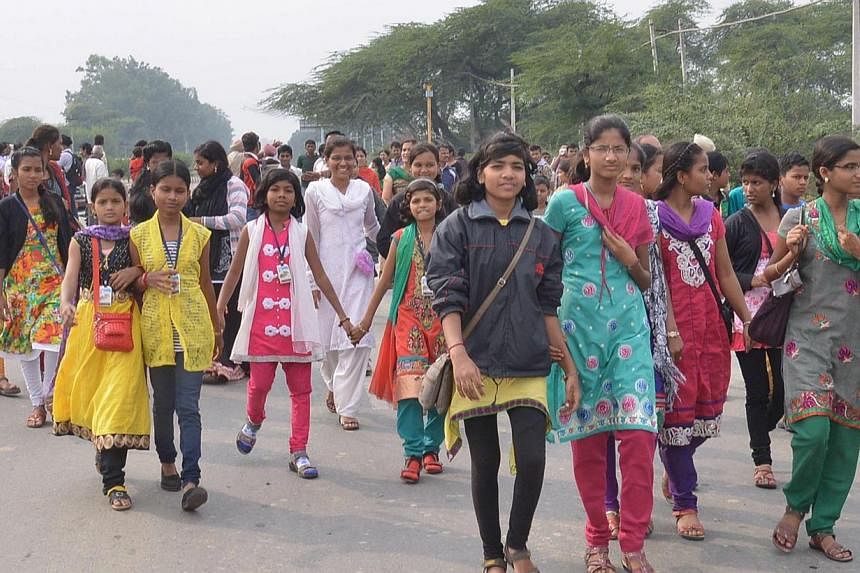LAHORE (AFP) - Pakistani border guards went ahead Monday with a colourful ceremony at a major border post with India, defying a suicide attack on the event a day earlier that killed 55 people.
The bomber struck at the Wagah border crossing near the eastern Pakistani city of Lahore on Sunday, causing carnage among crowds leaving the daily "flag-lowering" event that marks the closing of the frontier for the day.
The explosion, which wounded more than 120, was the deadliest to hit Pakistan in more than a year, but an official claimed there was no security lapse - despite admitting having received warning of an attack.
The strike came with Pakistan on high alert for the mourning days of Ashura, a flashpoint for sectarian violence in recent years.
A security source told AFP two alerts had been issued to Punjab provincial officials, including one about a possible attack at Wagah.
However a spokesman for the Rangers paramilitary force, which guards the border post, said the attack took place some distance from the parade.
"We had received an alert but the incident occurred in the commercial area, where people were gathered around food shops, the parade lane is quite a distance from the location of the blast," he told AFP. "It's not a security lapse."
At least two different factions of the Tehreek-e-Taliban Pakistan claimed the attack, the first major strike since the army launched an offensive against militant strongholds in the tribal northwest in June.
Despite the bloodshed, the ceremony went ahead on Monday, complete with Pakistani spectators in the stands.
The Punjab army corps commander Lieutenant General Naveed Zaman said the turnout "proved that terrorists can't break the morale and zeal of the nation".
Indian soldiers also took part on their side of the frontier.
Like many Pakistanis who attend the event, eyewitness Nawaz Khan had gone on Sunday with family members, visiting from the northwestern city of Peshawar.
"There were 14 of us. After the parade I came out of the gate and my brother told me to go back and bring the children," Khan told AFP.
As he returned with the children, he said, he saw a "young boy" running towards the gate, who was stopped by a Ranger.
"Then there was a huge bang and I saw my brother flying in the air. There were screams all around and the place was filled with the smell of burnt human flesh and blood," he said.
"I had lost the children and I was screaming for them and then I saw the body of my brother lying on the ground with other bodies," said Khan, whose children were found unhurt.
A senior officer with India's Border Security Force, Ashok Kumar, told AFP security would be strengthened as a result of the attack, but said he expected hundreds of Sikhs to go ahead with a planned pilgrimage to Lahore this week.
Security forces across Pakistan were on high alert Monday for possible attacks as Shiite Muslims mark Ashura, the anniversary of the death of Hussein, the grandson of the Prophet Mohammed, with mourning processions.
Around 10,000 police and paramilitary Rangers have been deployed in Islamabad and its twin city Rawalpindi, officials said.
Sectarian violence has been on the rise in recent years, mostly by Sunni Muslim extremists targeting Shi'ites who make up 20 percent of Pakistan's 180 million population. At least 11 people were killed in Ashura clashes in Rawalpindi last year.
Security analyst Hasan Askari said the security forces' focus on the Ashura threat may have made them take their eye off the ball at Wagah.
"There was a lot of security for the Muharram processions so this place was the easiest target," he told AFP.
"Security forces have taken a lot of precautions: they (militants) are now looking for soft targets." An editorial in Dawn newspaper speculated about a possible link to the ongoing anti-militant army operation in North Waziristan.
People watching the ceremony may have been "deliberately targeted because of their perceived support for the security forces", Dawn said.
The attack so close to the Indian border comes at a delicate point in relations.
Tensions between the nuclear-armed neighbours are running high after an upsurge in shelling incidents across the disputed border in Kashmir.
But Indian Prime Minister Narendra Modi condemned the "shocking" attack, describing it as a "dastardly act of terrorism".

